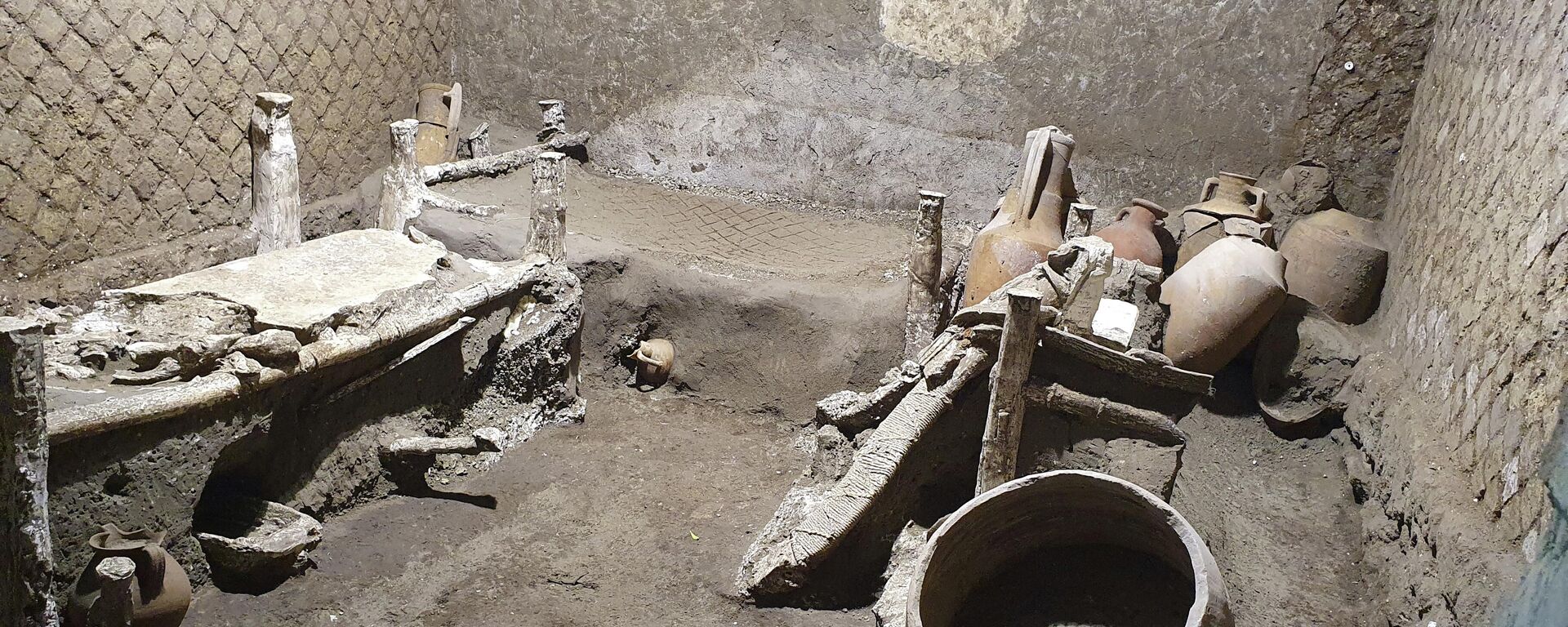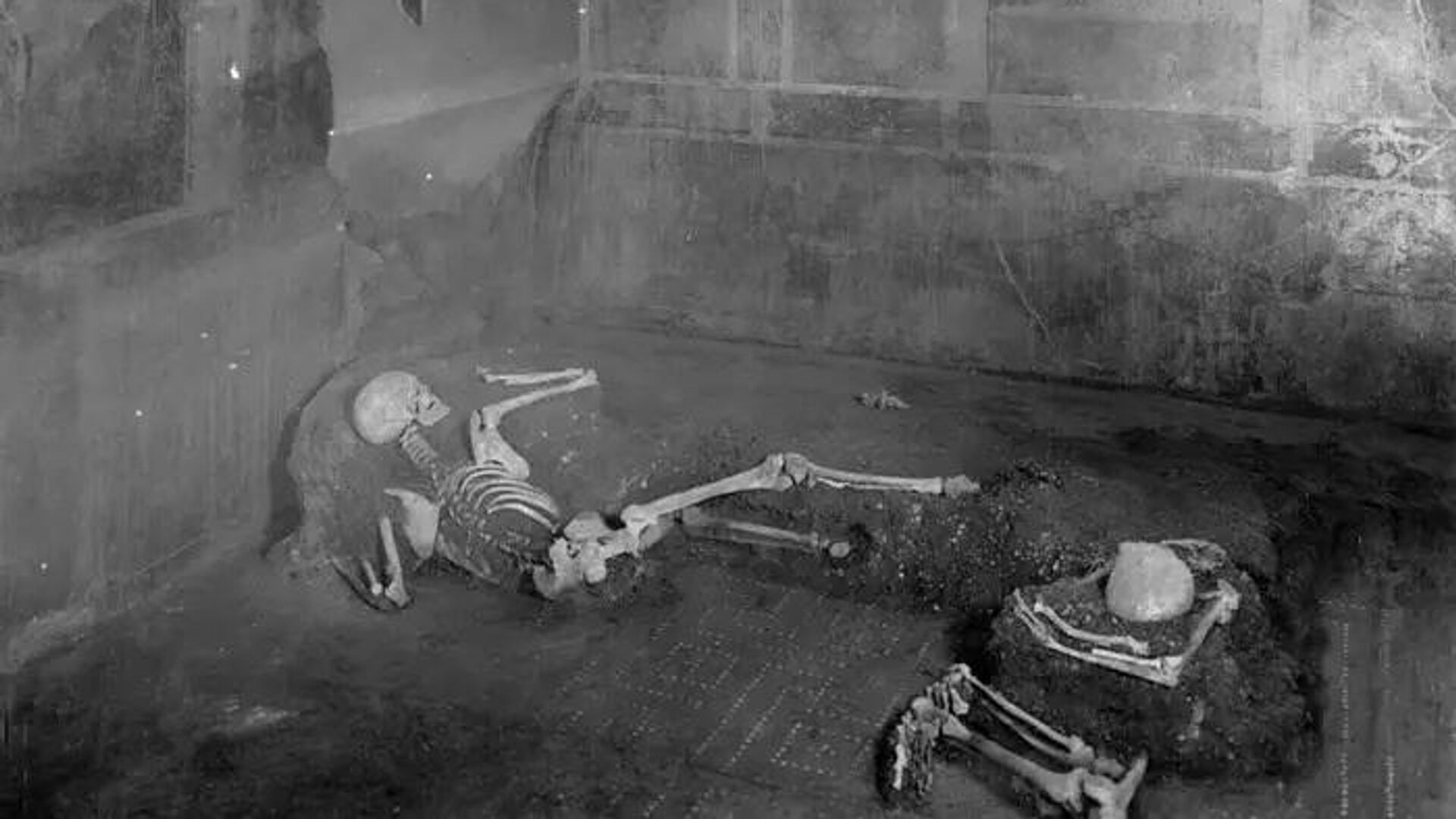https://sputnikglobe.com/20220808/new-discoveries-in-pompeii-showcase-the-citys-middle-class-1099366660.html
New Discoveries in Pompeii Showcase the City’s Middle Class
New Discoveries in Pompeii Showcase the City’s Middle Class
Sputnik International
Pompeii was destroyed in 79 AD after Mount Vesuvius erupted and covered the city in volcanic debris and ash. Much of the city and its inhabitants were... 08.08.2022, Sputnik International
2022-08-08T02:42+0000
2022-08-08T02:42+0000
2022-11-24T11:24+0000
pompeii
archeology
ancient rome
https://cdn1.img.sputnikglobe.com/img/07e6/05/1b/1095826763_0:131:700:525_1920x0_80_0_0_ad99359da4e7e7ea251d91418fef4e1a.jpg
Recent discoveries in Pompeii are revealing the lifestyle of the middle class in the ancient Roman city. Pompeii’s archaeological park announced its findings on Saturday. While much of the early studies of Pompeii were focused on the city’s elite, archeologists have increasingly become interested in the lives of the city’s middle and lower classes.The excavation of a home or “domus” started in 2018 and is now paying dividends. The house had a courtyard with a well-adorned cistern or water tank, but other parts of the house show that the owner may not have had unlimited funds to decorate their house. One of the five rooms was left unpainted and with an earthen floor. Archeologists believe it may have been used for storage.They also identified a bedroom with the remains of a bedframe and cloth from a pillow. The bedframe appeared identical to three cots found in a storage room that may have also served as sleeping quarters for enslaved people in the city.Another storeroom had built-in shelves and may have held dishes and cookware for a nearby kitchen. Archaeologists also discovered a storage trunk. While the trunk itself was damaged when the ceiling collapsed on it, they found a preserved oil lamp with carvings of the Greek god Zeus, called Iupiter by the Romans, transforming into an eagle.Archaeologists also found a fragment of what they believe was a translucent plate rimmed with emerald and cobalt blue and an intact incense burner shaped like a cradle.
https://sputnikglobe.com/20211108/videos-archeologists-discover-ikea-like-adjustable-beds-in-ancient-roman-city-of-pompeii-1090554428.html
ancient rome
Sputnik International
feedback@sputniknews.com
+74956456601
MIA „Rosiya Segodnya“
2022
News
en_EN
Sputnik International
feedback@sputniknews.com
+74956456601
MIA „Rosiya Segodnya“
Sputnik International
feedback@sputniknews.com
+74956456601
MIA „Rosiya Segodnya“
pompeii, archeology, ancient rome
pompeii, archeology, ancient rome
New Discoveries in Pompeii Showcase the City’s Middle Class
02:42 GMT 08.08.2022 (Updated: 11:24 GMT 24.11.2022) Pompeii was destroyed in 79 AD after Mount Vesuvius erupted and covered the city in volcanic debris and ash. Much of the city and its inhabitants were remarkably well preserved, turning it into both one of Italy’s biggest tourist attractions and valuable locations for archaeologists.
Recent discoveries in Pompeii are revealing the lifestyle of the middle class in the ancient Roman city. Pompeii’s archaeological park announced its findings on Saturday. While much of the early studies of Pompeii were focused on the city’s elite, archeologists have increasingly become interested in the lives of the city’s middle and lower classes.
The excavation of a home or “domus” started in 2018 and is now paying dividends. The house had a courtyard with a well-adorned cistern or water tank, but other parts of the house show that the owner may not have had unlimited funds to decorate their house. One of the five rooms was left unpainted and with an earthen floor. Archeologists believe it may have been used for storage.
They also identified a bedroom with the remains of a bedframe and cloth from a pillow. The bedframe appeared identical to three cots found in a storage room that may have also served as sleeping quarters for enslaved people in the city.

8 November 2021, 02:29 GMT
Another storeroom had built-in shelves and may have held dishes and cookware for a nearby kitchen. Archaeologists also discovered a storage trunk. While the trunk itself was damaged when the ceiling collapsed on it, they found a preserved oil lamp with carvings of the Greek god Zeus, called Iupiter by the Romans, transforming into an eagle.
"In the Roman empire, there was an ample chunk of the population that struggled with their social status and for whom 'daily bread,' was anything but a given,'' Gabriel Zuchtriegel, Pompeii’s archaeological park’s director said. "A vulnerable class during political crises and food shortages, but also ambitious about climbing the social ladder."
Archaeologists also found a fragment of what they believe was a translucent plate rimmed with emerald and cobalt blue and an intact incense burner shaped like a cradle.




